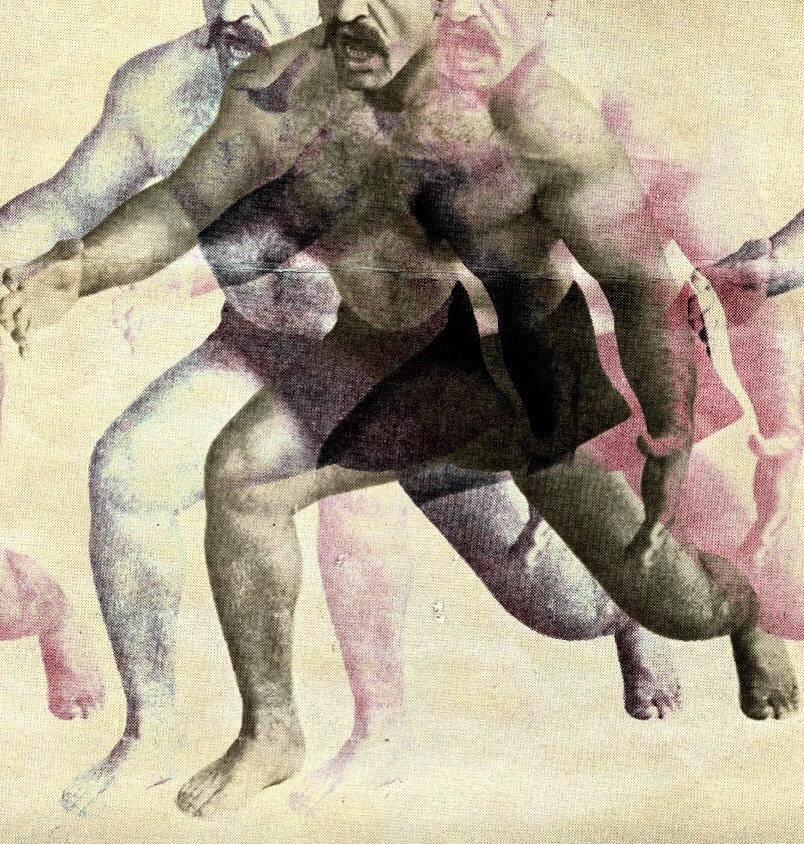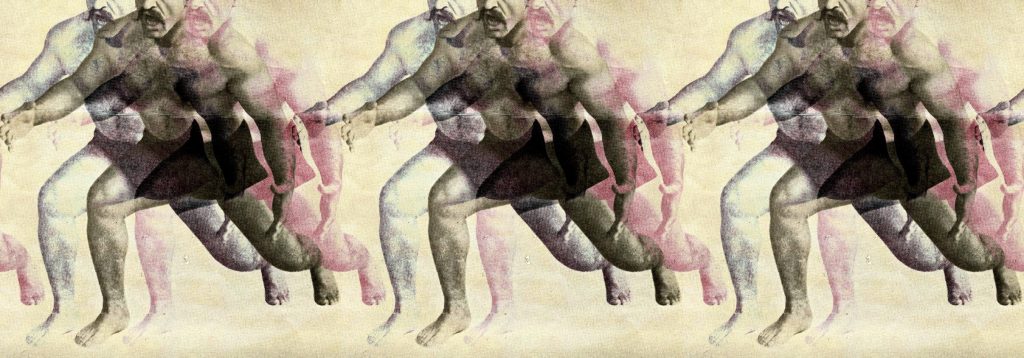Special for the Armenian Weekly
Note: The author’s roots can be traced back to Cilicia, Everek, and Yozgat. The Armenians of Yozgat were known for their wrestling (ըմբշամարտ) skills. This piece of fiction is based on oral history of the author’s family.
***

‘With each step, Avo was farther away from home, farther away from his village, farther from the life he had spent almost 20 years living.’
With each step, Avo was farther away from home, farther away from his village, farther from the life he had spent almost 20 years living.
His large, close-knit family had been a source of comfort. He felt equally at ease with women and men—an attribute, his mother reminded him, that would serve him well not only in finding a future wife but also in coexisting with her family. His uncle taught him how to roll a proper cigarette at the impressionable age of nine. His aunt preached the importance of peeling the peppers before making them into paste. He was comfortable with a rifle, serviceable with a needle and a pair of scissors. His father had taught him how to properly tend the fields—how to develop an innate sense about looming precipitation. He was strong, using his father’s might as a barometer for goals he would attain in the future. Avo was well versed in the necessity of hard work.
“Son, there’s an orphanage for orphans, a hospital for the sick, but there’s nowhere for lazy people. Hard work is life. Life is hard work.”
His father’s hands were calloused, firm. His personality didn’t match his palms, fingers. He wasn’t silent, unattached. He was emotional, cerebral. His father loved him, and didn’t hesitate to tell him so. Avo noticed the subtle signs of old age: more rest between bouts of the impactful thuds of the shovel, heavier breathing.
Avo thought he had it all sorted out. He would often allow himself to sink into daydreams. He’d soon make a plea for his father to start working less and allow him to assume more responsibility. The future would be serene. He would have many children. They would help him sow the seeds, harvest the crop, discuss life, talk about loved ones no longer with them.
His family’s fields had been torched. In front of him, his father’s hands cut off with a discolored spade, to serve as an example that protest was ill-considered. He had never seen his father cry before.
As he marched into the desert, the shrieks were loud both in his head and all around him. Avo thought his father had whelped not because of the pain he felt on his own skin but because of the impending agony his beloved family would not escape.
Avo had never been whipped before. His body had started to weaken under the constant physical assault, and his mind followed suit and started to wilt. It seemed his skin was trying to escape, jumping off his bones but getting caught on the threads of his garment. The pain was a reminder, though, that he was alive. His father was dead. His mother was dead. His sister was dead. His uncles were dead. His aunts were dead. His family. Dead.
The ember of remorse was smoldering within him. Why was he alive? He could not understand how such evil—fit only for fiction—could exist.
They were told to stop marching. The aggressors chatted away at roadside, chugging out of sun-kissed canteens, blowing tobacco into the air. Avo stopped moving. Blank stares surrounded him. A herd of people not sure how to emote. Defeated, stripped of everything human.
It had not yet been a year since his sister’s wedding. It was a humid, summer night. The entire village was basking in newlywed love. Food, wine, happiness. His father had never touched a drop of alcohol, but he made true on his promise of “drinking and dancing the night away’’ whenever one of his children decide to get married. Toasts from loved ones tiptoed through the summer air as the music lifted up memories and well-wishes into the early morning hours.
The ominous strain of horns and drums start to fill the desert plains. The monsters on horseback tilt their torsos toward the noise. They seem excited and start to give the newly arrived traveling performers a healthy measure of attention. After looking back at the group of tortured souls, almost to make certain they wouldn’t need undivided attention to continue to suffer, the soldiers start to engage with the crowd with whistles and cheers.
“Anybody who has had the pleasure to lay their eyes on him have done so with disbelief. Nobody has ever been witness to strength like his. He is made of flesh, but he is not a man. He does not feel pain; he does not feel remorse. He is not only a wrestler—he is a hero. He has traveled from sea to sea, crushing bones and spirits with vigor and ease.”
The wiry yet stocky man pointed at the behemoth with purpose. He massaged his mustache as the massive man he had introduced via flinging bravado was taking giant steps and showboating for the crowd.
The wrestler strutted in his sturdy leather trunks, his knees wrapped with coarse cloths. His immense chest glistened as the mixture of olive oil and water seemed to caress the sun’s powerful rays. The wind carried the waft of oil toward his scarred nostrils, and Avo started to salivate. The pain of his reality quickly overtook any sensations of hunger, however. His father was dead. His mother was dead. His family, dead.
“From sea to sea, to desert to desert, no man has ever toppled this giant. His legend will grow with each conquered man; he is made of myth, the ambassador of an empire, the defeater of all things unworthy.”
He had met a girl at his sister’s wedding. He had known of her, but had never before had the courage to make any kind of small talk. But weddings serve more than one purpose. They had officially met, danced, and spent most of the night in blissful dialogue. Sanan shared his love of literature. They agreed that the melancholy tone of their preferred authors might come off as one-dimensional, but it evoked emotion. It made them feel. It made them feel alive.
His father was dead. His mother was dead. His sister was dead.
Avo walked toward the drums with a slow, steady pace. His fellow tortured souls were startled by his obnoxious defiance of orders. After a handful of people tried to stop him, they turned away when he rejected their caution. They turned away, knowing the inevitable outcome. They could not bear witness to more violence.
The soldiers spotted Avo moving out of line. Ruthless insults flew his way, yet Avo showed no signs of obeying orders. The ignored thugs channeled their shock into an excuse to inflict savagery; it seemed to calm them. Laughter roared. One of the uniformed men had become overzealous in his quest for getting his hands on the rogue Armenian, and in doing so fell off his horse. The horse neighed, the men proceeded to laugh, the Armenians continued to cry out. At one point during the tragicomic soundtrack, the stocky promoter of the travelling circus took notice. As rifles were being readied, he noticed Avo walking toward his prized brute. He waved his hands with purpose, calling off the imminent pointblank kill. Through expressive gestures and delicate reasoning, he was able to make the officers understand that they need not waste their bullets. Avo would die a slow, painful death at the hands of his giant. Why permit the Armenian a quick death?
His father would snore the night away with a robustness that had to be respected. The nighttime noise always made him feel safe, protected. His mother would howl after he rubbed his strong, freshly shaven stubble against her pillowy skin, leaving the color of her cheeks a vibrant hue of pink. His sister hated tomatoes. He loved biting into the fleshy fruit, making sure its aroma would reach her annoyed senses.
He missed his father. He missed his mother. He missed his sister. They were gone, everything was gone.
Avo took his shirt off. The disfigurement etched on his body resembled the constellations he and Sanan had gazed upon on that special night. They had taken turns naming the stars, which winked appreciation from above.
The larger-than-life figure patiently waited for the young Armenian to reach arm’s length. He moved his tanned index finger back, then forth, urging Avo forward.

‘The larger-than-life figure patiently waited for the young Armenian to reach arm’s length. He moved his tanned index finger back, then forth, urging Avo forward.’
Avo calmly approached. His stare void of any human emotion. The giant man felt a chilly shudder across his bushy forearms. The young Armenian was looking through him, exuding an alarming serenity. The man cleared his throat, then proclaimed in his rehearsed, threatening tone.
“Come boy, come join your people in death.”
Source: Armenian Weekly
Link: Made of Flesh, a Man
